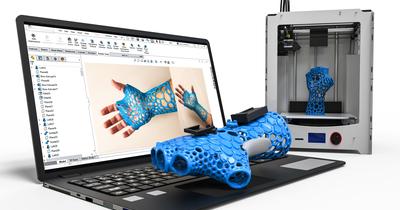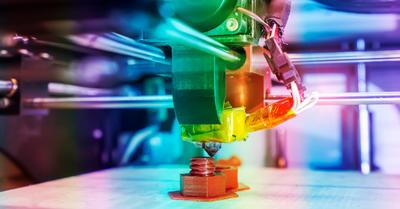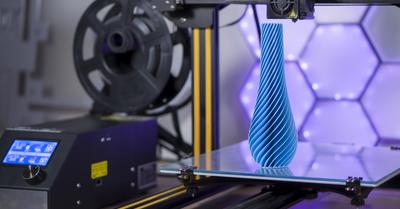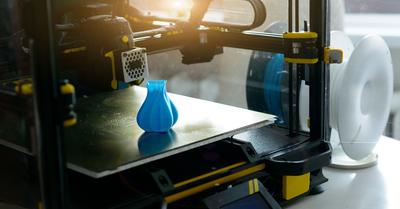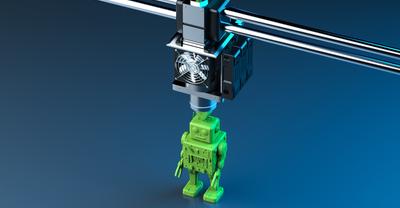How Can Shoes Be 3D Printed?
With the rise of 3D printing in the public sphere over the last few years, people are only just now discovering a process known as additive manufacturing that has been used in the corporate world for a while.
What Is Additive Manufacturing and How Does It Make Shoes?
According to GE, additive manufacturing is the process of fusing a series of incredibly thin, melted layers of material, one on top of the other, until they cool to create a single three-dimensional product.
This process also called fused deposition modeling, is directed by computer-aided-design (CAD) software like Nano CAD, 3D Crafter, or Adobe Dimension CC. This software instructs the nozzle where each of these layers needs to be in order to perfectly create this digital object in real life.
Specialized Software for 3D Printing Shoes
These CAD programs we mentioned are great for general 3D printing. However, the benefit of 3D printing becoming so popular and widespread is that people have created software specifically to fill in these niches.
Some programs that specialize in making your own 3D shoe design are Shoemaster, ICad3D+, and Romans Cad.
Shoes Can Be Fully Printed or Partially Printed
Major brands like Adidas, Nike, and Under Armor have started to 3D print different aspects of their shoes like mid-soles, cleats, and uppers (the part of the shoe that covers the foot). The 3D printed aspects of these shoes make the final product more lightweight, customizable, and easier to mass-produce.
Smaller companies like Fused, 3DShoes, and OESH-Shoes, manufacture completely 3D printed shoes that are made to order. Other brands, like FitMyFoot, offer 3D printed insoles and sandals. The number of brands making this available continues to grow, with SmarTech Analysis predicting 3D footwear to generate $6.5 billion by 2029.
The Customer’s Foot is Scanned to Ensure a Perfect Fit
For both partial and fully 3D printed shoes, the customer’s foot undergoes 3D scanning. Especially when the part of the shoe being printed is the midsole, this ensures each shoe is produced to perfectly match the foot of the customer for optimal performance and comfort.
At home, the best way to get your foot measurement is to make a mold of a pair of shoes that fit great. If you’ve got a great scanning program that works for feet you can do it the way the pros do, but using a shoe does the job.
Types of Shoes That Can Be Completely 3D Printed
In the last few years, significant advances have been made in what you can produce independently from the comfort of your own home.
Today you can make just about any type of shoe you want from sneakers, to dress shoes to high heels and beyond.
Just five years ago, you could only make sandals and slip-ons – and though they’d be functional, they might not have been exactly stylish. That being said, making sandals, slip-ons, and heels are still by far the easiest styles of shoes to make.
Simple sandals and slip-ons have the least intricate designs. The less intricate the shoe, the less work you’ll have to do beforehand – and the lower the likelihood you’ll end up with a product you can’t even wear.
What Materials Can 3D Shoes Be Made Of?
There are a number of materials people use to 3D print different products.
You wouldn’t want to use traditional 3D printing materials like Polylactic Acid, Nylon, Metal or Wood filament. A shoe printed with these products might look nice enough, but they’d be a pain (literally) to wear.
Shoes have the unique requirement of needing to be comfortable, flexible, and durable. In the last few years, to match the demands of the market, new high-performance materials have been developed specifically for these purposes. One such material is Thermoplastic Polyurethane, or TPU.
Thermoplastic Polyurethane (TPU) and 3D Shoes
TPU is a material that is best described as being somewhere between rubber and plastic. TPU allows for the 3D printed parts of the shoe to be:
- Shock-absorbent
- Waterproof
- Smooth to the touch
The downside to using TPU, which is one of the major caveats to 3D printing your own shoes at home, is that older 3D printers are not made to use these newer flexible materials. Newer printers, however, should be more suited to working with them.
According to 3DInsider, the best brands of TPU are NinjaFlex and PolyFlex, both of which can be purchased on Amazon.
Step-by-Step Guide to 3D Printing Shoes at Home
So, we’ve spent all this time talking about whether you can 3D print a shoe; let’s talk about exactly how you can go about making one.
Choosing a Design and Finding a Model
The first thing you’ll want to do is decide whether you want to use a premade design or design a shoe from scratch (which, admittedly, is incredibly difficult and time-consuming – but so is anything that is worth doing).
If you decide to go with a premade design, there are communities all across the internet of people who share their projects like Instructables.
You can find a great collection of 3D printing models here. This site has a plethora of free options and designs for every type of shoe you could imagine.
If You Are Creating a Shoe from Scratch
If you decide to go without a model, kudos to you. It’ll be a long, messy project, but in the end, you’ll have a pair of shoes you can say you made.
So, just like professional companies do, you’re going to need some dimensions and a mold. Get the dimensions of your foot – or in this case, the inside of a shoe you already own:
- Take the shoe you want to make a model of and tie it as though you were wearing it
- Stuff a plastic bag inside, ensuring it fills the entire area inside the shoe.
- Mix some plaster and pour the plaster into the bag, so it fills the inside of the shoe to make a mold.
After giving the mold some time to dry, untie the shoe and gently remove the mold. Be sure not to break it!
Time to Design
Now that you have the mold, you can get to the fun part – designing your shoe!
Take a profile picture of your shoe, and either by hand or on design software like Photoshop and start coming up with some fun designs to make your shoe the way you want.
Make a Digital Mold
Once you have a design you enjoy, you’ll make a 3D rendering of the mold using a program called 123D Catch. The program will instruct you to take 20-40 photos of the mold from different angles.
3D Modeling
Once the images are processed and rendered into a 3D mold, then you use one of the CAD programs we mentioned before to make a 3D model of your shoe. This is what you’re going to use to print!
Printing
Almost there! All that’s left for you to do is export your object as a .stl file and print! If you are a visual learner, check out this Instructables video to watch a member go from start-to-finish.
All that’s left after this is to wait for the printer to work its magic, and you’re all set with a new pair of 3D printed shoes!
Conclusion
As you can see, it is entirely possible to 3D print yourself a pair of shoes. And if you’re not the DIY type, there are plenty of manufacturers out there who will do it for you, resulting in a pair of shoes that fits your feet perfectly.




